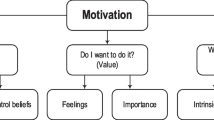Abstract
This study investigated the efficacy of collegiate attempts to help students cope with ethical dilemmas. Data were collected from 674 business students on their ethical frameworks and ethical behaviors. Modest support was found for the relationship between the frameworks used for decision making and the choices made when confronted with an ethical dilemma. Furthermore, it was found that ethical frameworks were generally resistant to change over time while behavioral choices did change over time.
Similar content being viewed by others
References
Ansberry, C. (1988, March 22). For These M.B.A.s, Class became exercise in corporate espionage.The Wall Street Journal, 37.
Bok, D.C. (1978). Can ethics be taught?Change, October, 27–32.
Brenner, S.N., and Molander, E.A. (1977). Is the ethics of business changing?Harvard Business Review, January–February, 60.
Chatov, R. (1980). What corporate ethics statements say.California Management Review, Summer, 20–29.
Dahl, J.G., Mandell, M.P., and Barton, M.E. (1988). Ethical frameworks of tomorrow's business leaders.International Journal of Value Based Management 1 (2), 65–81.
Fishbein, M. (1967). Attitude and the prediction of behavior. In: M. Fishbein (Ed.),Readings in Attitude Theory and Measurement. New York: Wiley.
Fishbein, M., and Ajzen, I. (1975).Belief, Attitude, Intention, and Behavior. Reading, MA: Addison-Wesley.
George, R. J. (1988). The challenge of preparing ethically responsible managers: Closing the rhetoric-reality gap.Journal of Business Ethics,7, 715–720.
Hearten, T. R. (1986). The ethics crisis continues: What to do?Management Review, November, 3.
Kerr, S. (1975). On the folly of rewarding A, while hoping for B.Academy of Management Journal,18, 769–783.
Murry, T. J. (1987). Can business schools teach ethics?Business Month, April, 24–26.
Pagano, A.M. (1987).Criteria for ethical decision making. Paper presented at the National Academy of Management Meeting, New Orleans, LA.
Paston, M. (1984). Ethics as an integrating force in management.Journal of Business Ethics,3, 293–304.
Parcel, T.V. (1976). Electing an angel's advocate to the board.Management Review, May, 4–11.
Rokeach, M. (1968).Beliefs, attitudes, and values. San Francicso: Jossey-Bass.
Schellhart, T.D. (1988). What bosses think about corporate ethics.The Wall Street Journal, April, 25.
Stevens, M. (1987).The insiders: The truth behind the scandal rocking Wall Street. New York: Putnam's.
The Defense Scandal (1988, July 4).Business Week, 29–30.
Author information
Authors and Affiliations
Rights and permissions
About this article
Cite this article
Watts, L.R., Ormsby, J.G. Ethical frameworks and ethical behavior: A survey of business students. Int J Value-Based Manage 7, 227–237 (1994). https://doi.org/10.1007/BF00897785
Issue Date:
DOI: https://doi.org/10.1007/BF00897785




